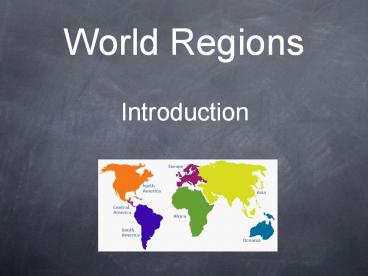World Regions PowerPoint PPT Presentation
Title: World Regions
1
World Regions
- Introduction
2
Learning about the World
- Despite differences in appearance, language or
ways of life, the people of the world share basic
needs for food, clothing, shelter.
3
What is Social Studies?
- Civics and Government
- History
- Economics
- Geography
- Culture and Society
4
Why Geography Matters
- By studying geography, you can find answers to
questions about Earth and the people who live on
it. - Geographers, the people who study geography, try
to understand relationships between people and
places on Earth and between different places.
5
Remember MR HELP
- Movement
- Regions
- Human Environment
- Location
- Place
6
Location
- Everything on Earth has its own location, or
where it can be found. The relative location of a
place tells where it is in relation to other
places. - The Absolute location, or exact location, of
place is its global address where it is on the
whole Earth.
7
Place
- Every location on Earth has a place identity made
up of unique features. - Landforms, bodies of water, climate, plant and
animal life are some of the physical features.
Buildings, roads, and people are some of a
places human features.
8
Regions
- Areas on Earth that differ from each other
because of their features are called regions. - Such features can be physical, human, economic,
cultural, or political.
9
Movement
- People, products, and ideas move from place to
place by transportation and communication. - Geography helps you understand how people came to
live where they do.
10
Movement Continued
- It also helps you understand the causes and
effects of movement. - A cause is an action that makes something else
happen. - An effect is what happens as a result of that
action
11
Human-Environment Interactions
- Humans and their surrounding affect each other.
- People modify, or change, their surroundings by
building cities, for example. - Surroundings can affect people, causing them to
adapt, or change to fit, the way they act, such
as wearing warm clothing in cold places.
12
Why History Matters
- Many things contribute to the way people live,
and one of the most important is history, or what
happened in the past. - History affects all people.
- Some beliefs and customs, or ways of doing
things, have been passed down from generation to
generation.
13
Relating Events in Time
- In history, time is the main subject of concern.
- The time order in which events in history take
place is called chronology. - Historians, the people who study history, analyze
the chronology of events to find links between
the past and the present.
14
Finding Evidence
- Historians look for evidence, or clues, about the
past in the objects and records that people have
left behind. - Historians analyze buildings, works of art,
photographs, and everyday tools, not just books
and papers. - They listen or read the stories people tell about
their pasts.
15
Finding Evidence Cont.
- A story told aloud by a person who did not write
down what happened or who did not have a written
language is an Oral History.
16
Identifying Perspective
- By reading the words and studying the objects of
people in the past, historians begin to
understand perspectives. - Perspectives are different points of view.
17
Understanding Frames of Reference
- Historians have a frame of reference, their own
perspective, as they study their past. - People need to be careful not to judge the
actions of people in the past based on the way
people act today
18
Frames of Ref. cont.
- Historical empathy is the ability to understand
people of the past in their own frame of
reference.
19
Drawing Conclusions
- To understand an event in the past, historians
need to analyze its causes and effects. - When you analyze something you break it into its
parts and look closely at how those parts connect
with one another - Then you can summarize and draw a conclusion
about how or why it happened.
20
Why Culture and Society Matter
- As you study world regions, you will compare and
contrast how people live. - The ways people act, speak and what they believe
make up a culture. - Each human group, or society, has a culture that
is unique in some ways.
21
Why culture Society matter cont...
- Their heritage is the wealth of ideas that have
been passed down through their history.
22
We will be studying...
- The United States
- Canada
- Middle (Central) America
- South America
- Australia
23
Why Civics and Government Matter
- To keep order and resolve conflicts in a society,
people need a government. - A government is a system of leaders and laws that
helps people live safely together in their
community, state, or country.
24
Why Civics and Government Matter Cont...
- There a different kinds of government in the
world. - Citizens rights and responsibilities vary from
one kind of government to the next. - Civic participation means being concerned with
and involved in issues related to your community,
state, or country, or the entire world.
25
Why Economics Matters
- To support its people, a society must have an
economy. - Economics is the study of the way that goods and
wealth are produced, distributed, and used in the
world. - The people must be able to make, buy, sell, and
trade goods and services to get what they need
and want.

